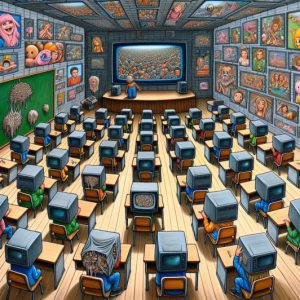
Introduction: Unveiling Inequality in the Justice System
June 24, 2023
In a world where wealth and privilege seem to hold great power, the phrase “the rich get richer, and the poor get prison” paints a grim picture of our society’s deep-rooted inequalities. This saying reflects the harsh reality that those with wealth and influence often enjoy advantages in the legal system while those less fortunate face the disproportionate weight of the law. In this article, we will explore the intricate relationship between socioeconomic status and the criminal justice system, shedding light on the disparities that persist and the consequences they have on society as a whole.
The Rich Get Richer, and the Poor Get Prison: Exploring the Imbalance
Understanding the Wealth Gap
The glaring disparity between the wealthy and the poor Economic differences are fueled by various factors such as inheritance, access to quality education, and social networks. This wealth gap sets the stage for many inequalities, including those within the criminal justice system.
A Fascinating read: Stock Investing For Dummies: Fearless Focus on the Trend
Wealth and Legal Representation
When individuals from different socioeconomic backgrounds find themselves entangled in legal matters, the availability of resources often determines the outcome of their cases. Wealthy defendants can afford top-tier legal representation, ensuring their rights are vigorously defended. In contrast, the poor are frequently assigned overburdened public defenders who may lack the time and resources to mount an effective defence. This discrepancy in legal representation exacerbates the unequal treatment of individuals within the justice system.
The Bail System: Presumption of Innocence or Monetary Advantage?
One area where socioeconomic disparities become particularly evident is the bail system. When an individual is arrested, they may be required to post bail to secure their release pending trial. However, one’s financial means heavily influence the ability to pay bail. Consequently, the poor often find themselves trapped behind bars, while the wealthy can secure their freedom regardless of the severity of their alleged crimes. This fundamental flaw perpetuates the justice system’s inequality and prejudice cycle.
Sentencing Disparities: A Glimpse into Injustice
Studies have consistently shown that disadvantaged individuals face harsher sentences than their affluent counterparts. Race, social status, and access to legal resources contribute to this disparity. The rich often benefit from reduced sentences, alternative sentencing options, or even avoiding conviction altogether. On the other hand, the poor are more likely to receive longer prison terms and limited opportunities for rehabilitation, perpetuating the cycle of poverty and criminality.
Conclusion
“The rich get richer, and the poor get prison” is not merely a saying; it is a distressing reality that unveils the inherent inequalities within our justice system. The disparities in legal representation, the bail system, and sentencing continue to perpetuate the cycle of poverty, reinforcing the social divide. To create a fairer society, it is crucial that we recognize these injustices and work collectively to address them. Only through systemic change and a commitment to equality can we hope to achieve a justice system that truly serves everyone.
FAQs (Frequently Asked Questions)
Q: Is the phrase “the rich get richer, and the poor get prison” just a saying, or is there empirical evidence to support it?
A: While the phrase itself is a concise expression of a larger issue, empirical evidence strongly suggests that socioeconomic status plays a significant role in the criminal justice system. Numerous studies have demonstrated the existence of disparities in legal representation, bail outcomes, and sentencing, all of which contribute to the perpetuation of inequality.
Q: Are there any initiatives aimed at addressing these inequalities?
A: Various organizations and advocates are actively working to address the inequalities within the justice system. Efforts range from criminal justice reform movements pushing for policy changes to initiatives focused on improving access to legal resources for disadvantaged individuals. However, much work must be done to create a truly equitable system.
Q: Does the imbalance in the justice system only affect individuals during the trial phase?
A: No, the consequences of inequality extend beyond the trial phase. Individuals who face harsh sentences are more likely to struggle with reintegration into society, leading to increased recidivism rates. Moreover, the impact is felt by entire communities as the cycle of poverty and criminality perpetuates.
Q: Is it possible to eliminate these disparities?
A: Achieving complete eradication of disparities within the justice system is a complex task that requires comprehensive reform. However, we can strive towards a more just and equitable society through systemic changes, increased access to legal resources, and addressing biases at all levels.
Q: Are there any success stories where individuals from disadvantaged backgrounds received fair treatment?
A: While instances of fair treatment for individuals from disadvantaged backgrounds do exist, they are, unfortunately, the exception rather than the norm. Highlighting these success stories can serve as a testament to the need for change and inspire efforts to create a more equitable justice system.
Q: What can individuals do to contribute to the fight against inequality within the justice system?
A: Individuals can contribute to the fight against inequality by supporting organizations that advocate for criminal justice reform, volunteering to provide legal aid, or staying informed about the issues. We can make a difference through collective action and a commitment to change.
From Our Archive: A Diverse Range of Articles to Explore

What Is the Key to Successful Investing? Patience and Discipline

How Can Economic Crises Lead to the Acceptance of Totalitarian Governments?

Future Market Insights: Move Beyond, Embrace the Trend

Collective Behavior Is Easy to Study: Let’s Dive In

long term vs short term investing in stocks: Understanding Key Differences

SPX 200-Day Moving Average: Unlocking Profitable Trading Strategies

What Percent of 18-29 Year Olds Are Investing in the Stock Market?

What Top Stocks to Buy Now: Mastering Your Entry Timing

History of Stock Market Crashes: Embrace Fear, Ignore the Noise

Rise in Sexual Immorality: Alarming Trends

How To Get Financial Freedom Fast: Escape the Herd for Lasting Success

Giving Content to Investor Sentiment: The Role of Media in The Stock Market

Considering the impact of inflation, Why Is Investing Important?

Technical Analysis of Stocks and Commodities: Unveiling Insights

Why Is the US Education System So bad: Rubbish In, Rubbish Out Phenomenon


